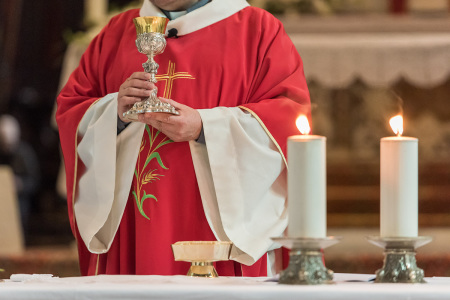Seminary graduates poised to be priests trending younger: survey

Catholic men set to become priests later this year are trending younger than average and said their parents often influenced their decision to pursue the vocation, according to a new survey.
The United States Conference of Catholic Bishops released the survey commissioned by the Center for Applied Research in the Apostolate at Georgetown University last Monday. It examined the backgrounds of nearly 400 men scheduled to be ordained into the priesthood. Based on responses collected between Jan. 10 and March 10 from 392 men expected to be ordained later this year, the survey had a margin of error of +/-2.7 percentage points.
The median age of respondents scheduled for ordination into the diocesan priesthood later this year was 31, meaning that half were between the ages of 26 and 31, while the other half were between the ages of 31 and 67. This means that more than half of the priests scheduled for ordination to the diocesan priesthood to serve as parish priests are younger than the average age of the ordinands slated to become diocesan priests, which was 33.
Since 1999, the average age of men scheduled to become diocesan priests has ranged from 32 to 37. On the other hand, men scheduled to become religious priests are slightly older than their diocesan counterparts. They had an average age of 36, and a median age of 35 in 2024. Since 1999, the average age of ordinands slated to become religious priests has ranged from 35 to 41.
Another finding in the survey revealed that 95% of ordinands were raised by their biological parents. When asked to name individuals who influenced their decision to become a priest, 32% of respondents identified their mother as someone who encouraged them to pursue the vocation, while 23% named their father. Among all respondents, mothers and fathers were the fourth and sixth most commonly cited influence behind their decision to pursue a religious life.
Among those scheduled to become diocesan priests, 35% listed their mother as an influence behind their decision, while 25% pointed to their father as a source of encouragement as they discerned their vocation. While mothers and fathers were the fourth and sixth most frequently listed influences among ordinands to the diocesan priesthood, much smaller percentages of ordinands to the religious priesthood listed their parents as people who encouraged them to pursue the vocation.
Twenty percent of religious ordinands said their mothers encouraged them to pursue the priesthood, while 17% said the same about their fathers. More frequently cited sources of encouragement among this group of ordinands included parish priests (42%), friends (40%), religious brothers and priests (37%), fellow parishioners (28%), campus ministers and school chaplains (23%), teachers and catechists (22%), religious sisters (22%) and grandparents (20%).
By contrast, only parish priests (68%), fellow parishioners (44%) and friends (42%) were more common sources of influence than mothers among diocesan ordinands, while teachers and catechists (26%) were less frequently cited than mothers but more commonly listed than fathers within this group.
These figures closely mirrored the statistics regarding sources of influence among respondents as a whole, with parish priests (63%), friends (41%) and parishioners (41%) comprising the top three as teachers and catechists (25%) rounded out the top five.
Bishop Earl Boyea of the Roman Catholic Diocese of Lansing, who serves as chairman of the USCCB’s Committee on Clergy, Consecrated Life and Vocations that commissioned the survey reacted to its findings about the role of parents in influencing the faith of their children in a statement: “Mothers and fathers, united in marriage, are the first witnesses to love for their children. It is within the family that children are taught the faith, learn the meaning of love, and grow in virtue.”
“This year’s study of ordinands underscores the fundamental role that families, in [particular] parents, play in building up the kingdom of God. It is through the love and support of the family that children develop into the men and women God calls them to be,” he added.
While more respondents cited their parents as sources of encouragement for their vocation as opposed to discouragement, 13% of ordinands surveyed maintained that their mothers discouraged them from pursuing the priesthood, while 12% said the same about their fathers. Among ordinands poised to become diocesan priests, 11% listed their mothers and another 11% identified their fathers as sources of discouragement, while slightly higher shares of religious ordinands said the same about their mothers (20%) and fathers (17%).
Friends or school classmates were listed as people who discouraged them from joining the priesthood by 20% of all respondents, 18% of diocesan ordinands and 31% of religious ordinands. Meanwhile, other family members besides parents were identified as discouraging voices by 20% of all respondents, 17% of diocesan ordinands and 32% of religious ordinands.
Ryan Foley is a reporter for The Christian Post. He can be reached at: ryan.foley@christianpost.com





















